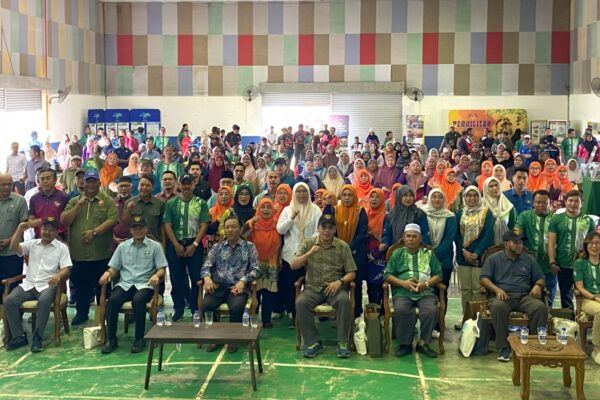2-minute read
With agribusiness Socfin and the National Forestry School (NFS), Earthworm Foundation began its first RaCP (Remediation and Compensation Procedure) project to restore 1,568 hectares of degraded forest in Cameroon’s Centre Region.
On 28 January 2022, the Roundtable on Sustainable Palm Oil (RSPO) approved a Remediation and Compensation Procedure project submitted by SOCAPALM Mbambou, in collaboration with Earthworm Foundation and partner NFS. Approval of the RaCP project is part of the RSPO Sustainable Palm Oil certification process, with which SOCFIN and its Cameroonian subsidiary SOCAPALM have been engaged for several years.
Socfin Group – an oil palm and rubber producer with operations across Africa and Asia – has been an Earthworm Foundation member since 2017. The partnership involves conducting field visits to Socfin's operations across Africa to support implementation of the group's Responsible Management Policy.
SOCAPALM is a subsidiary of Socfin and has 6 operational sites in Cameroon; one of them is Mbambou, an oil palm plantation based in Littoral Region, Cameroon and a subsidiary of SOCFIN.
A map of SOCAPALM Mbambou.
As part of the RSPO certification process, SOCAPALM Mbambou is required by RSPO Principle and Criteria Indicator 7.12.8 – as a result of a Land Use Change Analysis (LUCA) study that identified areas to compensate – to apply the Remediation and Compensation Procedure (RaCP) “where there has been clearing without prior High Conservation Values (HCVs) assessment since November 2005, or without prior High Conservation Value-High Carbon Stock Approach (HCV-HCSA) assessment since 15 November 2018."

To meet this RSPO requirement, SOCFIN sought support from Earthworm Foundation to develop a draft RaCP. After several consultations with NFS, which has a Forest Management Unit (FMU 08-005) in the Centre Region of Cameroon, the RaCP project was developed and approved by RSPO. The project involves implementing a restoration project on 1,568 hectares of degraded forest in a Forest Management Unit (FMU), which is a state-owned forest designated for commercial use.
The objectives of this restoration project are to:
- Reforest 1,568 hectares of degraded forest in FMU 08-005 over 25 years;
- Secure the FMU and reforestation/restoration activities;
- Contribute to the reduction of human-led pressure in the FMU. This will be done through:
- providing jobs for riparian communities, who live close to land bordering rivers or streams, to do work like preparing nursery sites and opening fire breaks;
- training riparian populations on the management of forest and agroforestry woodlands;
- supporting implementation of income-generating activities.
- Consolidate the training and research objective assigned to FMU 08-005.

These planned objectives aim to have a long lasting impact on the conservation of FMU 08-005.
The Roundtable on Sustainable Palm Oil (RSPO) promotes sustainable production of palm oil and its accessibility on the market. It brings together producers, distributors, environmental protection associations and other organisations.


